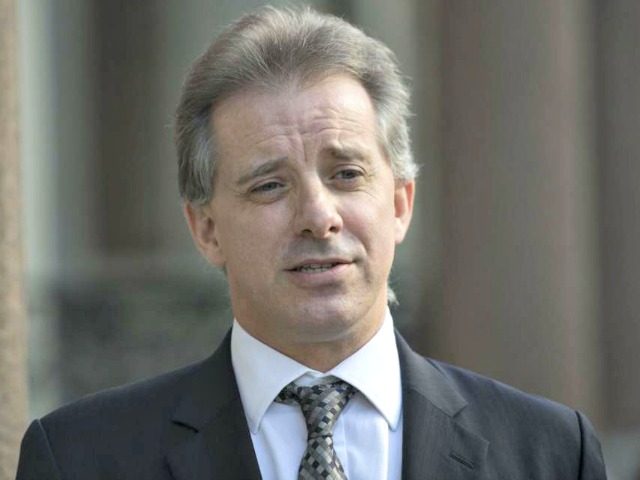The primary source for ex-British spy Christopher Steele’s “pee dossier” alleging Russian collusion was a U.S.-based researcher who previously worked at the Brookings Institution, not a well-connected Russia-based source as once believed.
The revelation was highlighted in a recent New York Times report that confirmed the name of the 42-year-old researcher as Igor Danchenko, who was born in Ukraine and is a “Russian-trained lawyer” who earned degrees at the University of Louisville and Georgetown University.
He spent five years, from 2005 to 2010, as a senior research analyst at the Brookings Institution, a center-left think tank in Washington, D.C., according to the Times.
Danchenko’s lawyer, Mark E. Schamel, told the Times it was a paid assignment to gather allegations about Trump’s ties to Russia and bring them to Steele’s research firm, Orbis Business Intelligence.
The Times noted that Danchenko’s involvement as the dossier’s “primary source” casts further doubt on the credibility of the dossier. Times reporters Adam Goldman and Charlie Savage wrote:
Mr. Danchenko’s identity is noteworthy because it further calls into question the credibility of the dossier. By turning to Mr. Danchenko as his primary source to gather possible dirt on Mr. Trump involving Russia, Mr. Steele was relying not on someone with a history of working with Russian intelligence operatives or bringing to light their covert activities but instead a researcher focused on analyzing business and political risks in Russia.
The dossier, commissioned by the Democratic National Committee and the Hillary Clinton campaign and outsourced to Fusion GPS, was defended by Democrats as credible since its author, Steele, was a former MI6 spy who had previously worked with the FBI and was believed to have connections in Russia.
Even Schamel appeared to distance Danchenko’s research and the final dossier, which claimed the Trump campaign was colluding with Russia and was used as evidence to obtain secret surveillance warrants to spy on former Trump campaign adviser Carter Page.
Schamel told the Times:
Mr. Danchenko is a highly respected senior research analyst; he is neither an author nor editor for any of the final reports produced by Orbis. Mr. Danchenko stands by his data analysis and research and will leave it to others to evaluate and interpret any broader story with regard to Orbis’s final report.
FBI documents recently declassified by Attorney General Bill Barr and released by Sen. Lindsey Graham (R-SC) showed discrepancies between what Danchenko said he gave to Steele and what Steele later wrote in the dossier.
According to the documents, in an interview Danchenko had with the FBI as early as January 2017, he told the FBI he disagreed with and was surprised by how the information he gave to Steele was conveyed in the dossier.
He told the FBI he did not recall or did not know where some of the information attributed to him or his sources came from. He also said he was never told about or never mentioned to Steele certain information attributed to him or his sources.
He also said Steele re-characterized some of the information to make it more substantiated and less attenuated than it really was, that he would have described his sources differently, and that Steele implied direct access to information where the access to information was indirect.
Despite Danchenko telling the FBI this in January 2017, the FBI investigation into the Trump campaign continued until March 2019.
Graham’s office said in a statement:
- This document not only demonstrates how unsubstantiated and unreliable the Steele dossier was, it shows that the FBI was on notice of the dossier’s credibility problems and sought two more FISA application renewals after gaining this awareness.
- The document reveals that the primary “source” of Steele’s election reporting was not some well-connected current or former Russian official, but a non-Russian based contract employee of Christopher Steele’s firm. Moreover, it demonstrates that the information that Steele’s primary source provided him was second and third-hand information and rumor at best.
Danchenko’s role was first mentioned in Justice Department Inspector General Michael Horowitz’s report last year, although his name had been redacted.
Horowitz revealed in his report on the FBI’s handling of its investigation into the Trump campaign that Danchenko’s interview with the FBI in January 2017 was inconsistent with important parts of the dossier, but the FBI still used the dossier to obtain two more warrants to spy on Page.
Horowitz also found that the FBI told the court granting the warrants that it had spoken to Steele’s primary source, but did not mention that Danchenko’s statements raised doubt about the dossier’s credibility.
The FBI also claimed in its warrant applications that Danchenko was “Russian-based” — which was not true.
Connecticut Attorney General John Durham has been investigating the FBI’s conduct in investigating the Trump campaign, and has reportedly asked questions about Danchenko’s role in the dossier.
Follow Breitbart News’s Kristina Wong on Twitter or on Facebook.

COMMENTS
Please let us know if you're having issues with commenting.